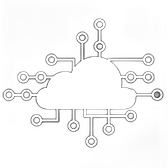-
How to Create an ALB Listener with Multiple Path Conditions Using Terraform
When designing modern cloud-native applications, it’s common to host multiple services under a single domain. Application Load Balancers (ALBs) in AWS provide an efficient way to route traffic to different backend services based on URL path conditions. This article will guide you through creating an ALB listener with multiple path-based routing conditions using Terraform, assuming […]
-
How to Create a New AWS Account: A Step-by-Step Guide
Amazon Web Services (AWS) is a leading cloud service provider, offering a wide array of services from computing power to storage options. Whether you’re an individual developer, a startup, or an enterprise, setting up a new AWS account is the first step toward leveraging the power of cloud computing. This article will guide you through […]
-
Where is the Kubeconfig File Stored?
The kubeconfig file, which is used by kubectl to configure access to Kubernetes clusters, is typically stored in a default location on your system. The default path for the kubeconfig file is: The ~/.kube/config file contains configuration details such as clusters, users, and contexts, which kubectl uses to interact with different Kubernetes clusters. How to […]
-
Installing and Testing Sealed Secrets on a k8s Cluster Using Terraform
Introduction In a Kubernetes environment, secrets are often used to store sensitive information like passwords, API keys, and certificates. However, these secrets are stored in plain text within the cluster, making them vulnerable to attacks. To secure this sensitive information, Sealed Secrets provides a way to encrypt secrets before they are stored in the cluster, […]
-
How to Manage Kubernetes Clusters in Your Kubeconfig: Listing, Removing, and Cleaning Up
Kubernetes clusters are the backbone of containerized applications, providing the environment where containers are deployed and managed. As you work with multiple Kubernetes clusters, you’ll find that your kubeconfig file—the configuration file used by kubectl to manage clusters—can quickly become cluttered with entries for clusters that you no longer need or that have been deleted. […]
-
GKE Autopilot vs. Standard Mode
When deciding between GKE Autopilot and Standard Mode, it’s essential to understand which use cases are best suited for each mode. Below is a comparison of typical use cases where one mode might be more advantageous than the other: 1. Development and Testing Environments 2. Production Workloads 3. Microservices Architectures 4. CI/CD Pipelines Billing in […]
-
GKE Autopilot vs. Standard Mode: Understanding the Differences
Google Kubernetes Engine (GKE) offers two primary modes for running Kubernetes clusters: Autopilot and Standard. Each mode provides different levels of control, automation, and flexibility, catering to different use cases and operational requirements. In this article, we’ll explore the key differences between GKE Autopilot and Standard Mode to help you decide which one best suits […]
-
Using Sealed Secrets with ArgoCD and Helm Charts
When managing Kubernetes applications with ArgoCD and Helm, securing sensitive data such as passwords, API keys, and other secrets is crucial. Bitnami Sealed Secrets provides a powerful way to encrypt secrets that can be safely stored in Git and used within your ArgoCD and Helm workflows. This guide will cover how to integrate Sealed Secrets […]
-
Bitnami Sealed Secrets
Bitnami Sealed Secrets is a Kubernetes operator that allows you to encrypt your Kubernetes secrets and store them safely in a version control system, such as Git. Sealed Secrets uses a combination of public and private key cryptography to ensure that your secrets can only be decrypted by the Sealed Secrets controller running in your […]

